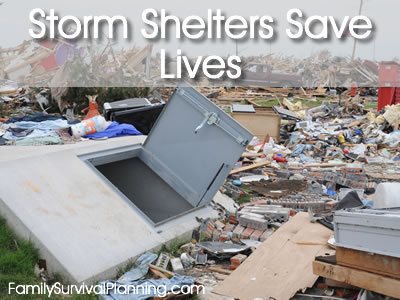- HOME
- Preparing for Disasters
- Self Reliance
FEMA Will Not Save Us —
Self Reliance Will

(Updated 10/1/2024)
I'm sure you have watched, as I have, the devastation as Hurricane Helene obliterated homes and businesses and left many dead, injured, and homeless, without electricity, food, and water.
The first question we all have is: Who's going to help them? Of course, the first responders are police and local organizations.
But where is the federal government in this disaster? As of today, I read that no help from the federal government has shown up - yet. Where's FEMA? Why aren't they there as quickly as possible? I was curious so I researched to see that their job is exactly.
Most people don't understand exactly what FEMA does and does not do, what their responsibilities are, and how they do help during a disaster. What I learned is that it's not FEMA's job to save people, clean up the debris, or feed the people.
Invest in emergency food storage now and enjoy peace of mind for the next 25 years. Don't miss out on the savings!
Here's what I learned:
FEMA staffers aren't and shouldn't be first responders.
- FEMA is often viewed as first responders rather than an extension of state and local entities.
- FEMA provides technical and financial support only. The real first responders should be and are the local police, fire, and the people who are trained and able.
FEMA doesn't have tens of thousands of manufactured homes and travel trailers just stored somewhere ready to go in case of a disaster.
Brock Long, FEMA Chief states they have to order, build, install and inspect each manufactured home at a cost of $200,000 to $300,000 before they go to a family for a temporary lease of 18 months.
"And then when it's done, I'm not allowed to reuse that trailer. I can't refurbish it and reuse it. We have to dispose of it." Long describes his desire to streamline the cumbersome inspection process while passing housing and reconstruction responsibilities down to states and counties. (source)
NOTE: The reason FEMA is not allowed to reuse or refurbish a trailer is because they do not want a lawsuit when someone 'inherits' a used trailer that could have mold or other pathogens harmful to humans as happened after Katrina.
FEMA doesn't do clean up — it's not their job to physically get involved.
So, what is their job?
"FEMA doesn't do debris," Long explains. They write the check, but it's ultimately up to the governor to make sure your federal tax dollars are spent wisely. [emphasis mine]
"There was a huge demand for debris contractors ... but I don't think FEMA should dictate the market rate of the private sector. We encourage them to find a competitive and fair rate, or we don't reimburse.
But exactly HOW that money is spent comes down to governors, mayors and county managers. Thus millions of survivors now have a new, keen interest in local elections. (source)
FEMA is Broke
Brock Long wants everyone to understand these three fundamental truths:
- FEMA is broke.
- The system is broken.
- If this is the new normal, Americans can't rely on a federal cavalry when disaster strikes. They will have to take care of themselves.
We all know that millions of Americans are most likely going to live through a future disaster. Long states:
"Americans are the true first responders," Long says. "We've gotta get back to the basics, and teach people tangible skills, not only how to do CPR and first aid but to shut off your house gas lines or water lines after a disaster. We've gotta get people to save money. They need their own rainy day account."
Self Reliance is the Only Answer
As Brock Long stated, "We [the people] are the first responders." So what can you do prepare for that responsibility?

How are YOUR preparations progressing?

Any small or large task you choose to further your preparations is a step toward self-reliance.
- Inventory your supplies to see what you are lacking.
- Most important is food and water storage and a water purification method.
- Acquire supplies for cooking, heating, lighting, and sanitation as you can afford them.
- Learn new skills — CPR, first aid and survival medicine, outdoor cooking, gardening, etc.
- Teach others and learn from others.
- Get family and friends "onboard", if possible.
- Create an emergency fund — cash for crisis situations, a "rainy day" fund for personal emergencies.
- Learn ways to protect your family, whether it's learning to use a gun or some other type of weapon, or a self-defense class.
Just to emphasize the importance: We, the prepared people, are the first responders in any crisis. It's up to us to get ready.
Are you ready to be more self reliant?














